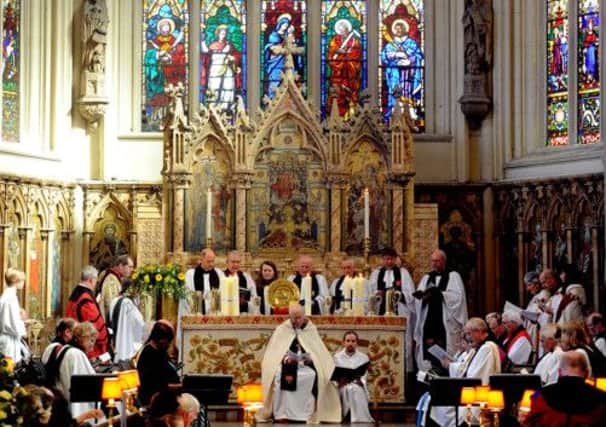Tim Jones: Faith still matters as people find worth of church


There are all kinds of reasons why someone does or does not come to church. Many people get all the weekly socialising they need at the pub, or at the bowls club, or at Zumba. There are all kinds of other things to do on a Sunday morning. A whole bunch of people think it’s all a load of tosh.
The Church of England has just posted figures which show a surge in church attendance over recent years. Not on Sundays, you understand – the news isn’t that good – but certainly for special services, especially at Christmas. And the decline in C of E Sunday attendance nationally has actually slowed almost to a standstill, and is more than offset by the growth of less traditional church communities, from whom the C of E is learning a great deal, very rapidly.
Advertisement
Hide AdAdvertisement
Hide AdBelief for most of us is something that ebbs and flows, a mixture of wonder at life, hope that God really is there, and some awareness that the ancient stories and traditions actually have something in them. At Christmas all of that comes to the fore. No real surprise that more people than usual come to church for those special services. The question is why, in our secular age, the numbers coming have been rising – accelerating – in recent years?
This week I took the funeral of Joan Lister, a member of St Hilda’s, who was in her 80s but seemed much younger. A couple of weeks ago, she finished a conversation with a neighbour at her front door, then suddenly collapsed and died. It has been an awful shock – she was cheerful, clever, active and bright.
There is a picture of her in a book produced by our local history society, taken when she was a young woman, maybe still a teenager, delivering milk for Northern Dairies. Her hair is tied up in a scarf. Fashions have come full circle, and she looks, by today’s standards, utterly trendy. In fact, she looks gorgeous.
In the last few days, preparing for Joan’s funeral, I’ve sat in her neat, comfortable living room. Her lifestyle was not lavish, but it was good. When she was born, three-quarters of the population were working class. Joan was born into poverty; one of nine children, her parents and some of her siblings died young from poverty-related disease.
Advertisement
Hide AdAdvertisement
Hide AdFor a while, the orphaned children were cared for by local nuns. Joan was unusual – she hardly ever missed church, throughout her life, with all its ups and downs.
The story of the decline of church attendance over the late 20th century is in large part a story of the decline of working class church attendance. That’s also about the decline of the working class itself – the “traditional working class” is a mere fraction of its former size. In recent generations, the standard of living for most of us has massively improved. We’re richer, and it’s taking time to get our heads round being this affluent.
What is truly important in life, now that most of us can pop to Lanzarote every so often, and so few of us share Joan’s experience of seeing the family cut down by diphtheria?
Maybe the economic downturn has alerted us to the transience of good times. Church attendance isn’t rising simply because the economy is bad – apparently we buy better underwear and lipstick to cope with all of that – but maybe, after the horrors of the world wars, our meteoric affluence distracted us for a while from other, subtler, truer things. Maybe we’re just settling down a bit, less excited by the central heating and car ownership than we used to be.
Advertisement
Hide AdAdvertisement
Hide AdTo be honest, I think the actual number of different people who come to the Church of England for normal Sunday services is already well on the increase all over the place, and has been for several years.
Joan Lister will no longer come to our church every Sunday, but there are other adults much, much younger, who have each, in recent years, started to come to church several times a year. Their faith matters to them. Whether people come to church just for Midnight Mass, or 10 times a year, or 50 times a year, their faith matters. The main reason I go to church is because I think – or at least suspect – that’s its true, or true enough. Growing numbers seem to agree, and think it worth making the effort.